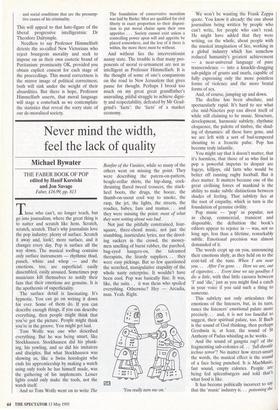Morality is unspeakable
Raymond Carr
THE DE-MORALIZATION OF SOCIETY by Gertrude Himmelfarb lEA, £12.50, pp. 314 This is a tract for our times written by a distinguished historian with a rare gift for clear and elegant exposition. Its polemical intent is clear. It is published by the Insti- tute of Economic Affairs, the free market think tank; Lady Thatcher, as a defender of the Victorian family values of hard work, self-reliance and living within one's income, rates more references than any other public figure, alive or dead.
Neil Kinnock thought he had rebutted Lady Thatcher's Victorian revivalism by asserting 'the Victorian values that ruled were cruelty, squalor and ignorance'. It is Kinnock who is ignorant, in presenting this travesty of Victorianism. He confuses moral values with social realities. Professor Himmelfarb is well aware of the harsh real- ities of Victorian England. But Victorians did not espouse cruelty or ignorance as a value, and their record as reformers is impressive, while the fact that eminent Vic- torians often failed to live up to the values they professed to uphold does not neces- sarily turn them into a race of hypocrites. They agonised over their lapses from virtue as Gladstone did in his struggle against the venial sin of masturbation; he was aware that his obsession with the redemption of prostitutes might represent 'filthiness of spirit' and he sought to beat it out by self- flagellation. Needless to say, latter-day Lytton Stracheys would castigate this as a resort to another form of sexual perversion.
Professor Himmelfarb rejects out of hand another common onslaught on Victo- rian moralism: that it was imposed on the lower classes by a hegemonic middle class in it own interests as an instrument of Social control. It is true that Victorians had inherited something of the earlier belief that Sunday Schools would inoculate the lower orders against the virus of 1789. It is also true that the lower classes sought the respectability of middle-class values for their own sake. It was their sign of identity as citizens deserving the vote. Hence the working-class Temperance Movement. The working class saw themselves committed to middle-class values, the moral superiors of an aristocracy whose spare-time occupation was adultery. The diaries of my great great grandfather, an under footman in London, never able to hold down a job, reveal his total commitment to family values in his painful struggle to support his wife and child. When he failed and was forced to send his wife and my great grandfather to the country, where they would be eligible for poor relief, he killed himself. Again, like some middle-class feminists, working- class women opposed birth control as an `artifice to indulge men's sensuality', a threat to family values as teaching men to `repudiate fatherhood'.
Professor Himmelfarb insists on the sur- prising extent of private philanthropy, administered not by paid social workers but by the philanthropists themselves. She hammers home that the aim of Victorian philanthropists was always to encourage its working-class objects to help themselves; they were capable of self-improvement and to think otherwise was to demean them as moral beings. This vision would take harsh forms. 'The less eligibility' test of the 1834 Poor Law was intended to make a stay in the workhouse less desirable than the life of an independent labourer, to attach a stigma to dependent pauperism. 'Today the very word stigma has become odious, whether applied to dependency, illegitima- cy, addiction or anything else'.
But stigmas are the corollary of values and since the Victorians took values seri- ously they took seriously the need for social sanctions that would stigmatise their viola- tion. Professor Himmelfarb shares the con- servative contention that modern welfare systems create incentives to remain in dependency. After defining 'substance users' as 'disabled' and therefore entitled to public assistance, the US Supplementary Income Program cuts off funds from those who seek to overcome their addiction and rewards those who remain addicts. This she sees as the polar opposite of the 'less eligi- bility' test that was the keystone of Victori- an philanthropy.
`It is the reluctance to speak the lan- guage of morality far more than any specif- ic values that separates us from the Victorians'. The triumph of Victorian moralism was its capacity to combine praise for fruits of economic individualism with an ethos that kept such individualism in check. Thus conservatives who argue that the unrestrained pursuit of individual economic interest will solve our problems will create a moral desert and call it the good society. Victorian moralism worked — it cut the illtgitiniacy and crime rates that were to rise spectacularly once it became unfashionable in the 1950s and 1960s because it turned on a concept of self that has been eroded in our society, where we distance moral responsibility from the moral agent.
We have become accustomed to the transfer- ence of responsibility from the individual to society — from the criminal to the economic
and social conditions that are the presump- tive causes of his criminality.
This will appeal to that hate-figure of the liberal progressive intelligentsia: Dr Theodore Dalrymple.
Needless to say Professor Himmelfarb detests the so-called New Victorians who reject bourgeois morality and seek to impose on us their own esoteric brand of Puritanism: promiscuity OK., provided you obtain explicit consent for each stage of the proceedings. This moral correctness is the mirror image of political correctness; both will sink under the weight of their absurdities. But there is hope, Professor Himmelfarb asserts, that moral language will stage a comeback as we contemplate the statistics that reveal the sorry state of our de-moralised society.
The foundation of conservative moralism was laid by Burke: Men are qualified for civil liberty in exact proportion to their disposi- tion to put moral chains upon their own appetites . . . Society cannot exist unless a controlling power upon will and appetite be placed somewhere, and the less of it there is within, the more there must be without.
And without lies the interventionist nanny state. The trouble is that many pro- ponents of moral re-armament are not as intelligent as Professor Himmelfarb. It is the thought of some of one's companions on the road to New Jerusalem that gives pause for thought. Perhaps I brood too much on my great great grandfather's unavailing, pitiful struggle to achieve digni- ty and respectability, defeated by Mr Grad- grind's 'facts': the 'facts' of a market economy.



































































 Previous page
Previous page